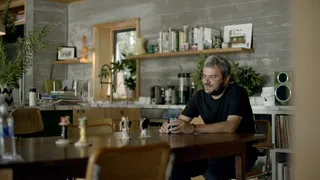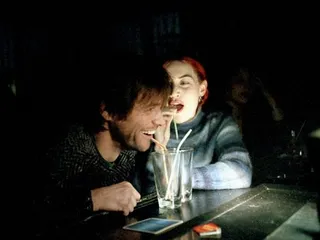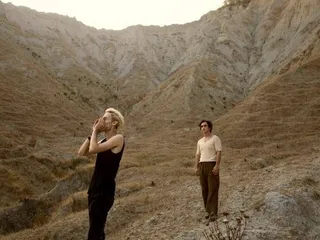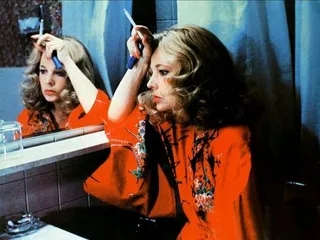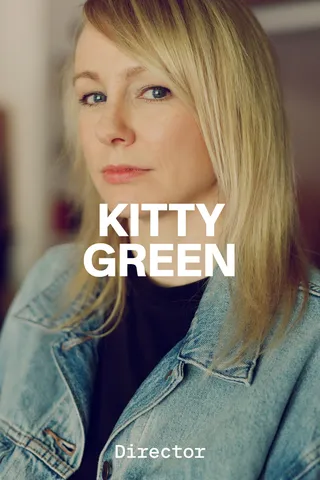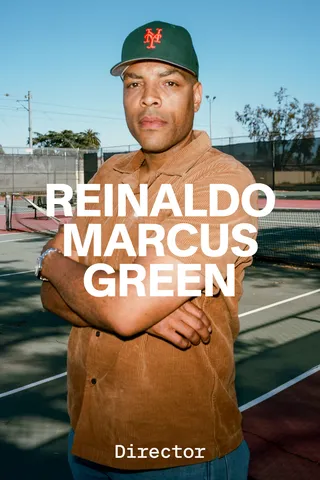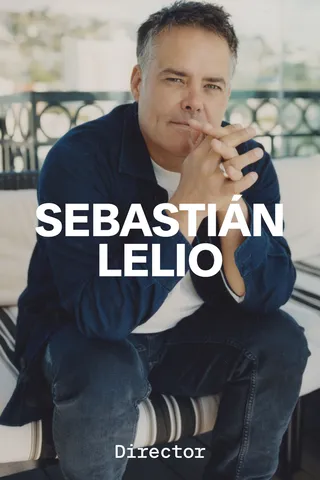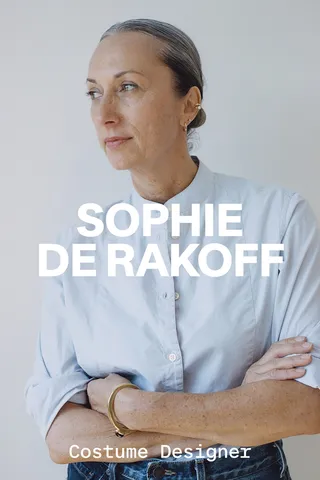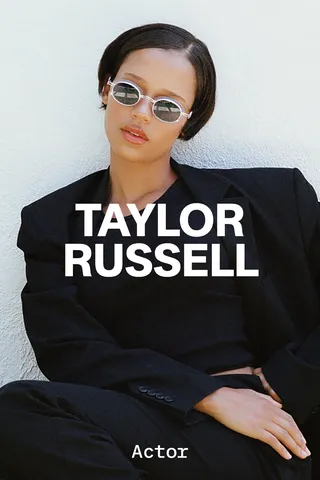Christos Nikou
Couching tender romanticism in absurdist humor, Greek filmmaker Christos Nikou has established a strong directorial voice in his ascendant career. His first feature, Apples (2020), is a tragicomic rumination on memory and identity, while his English-language debut, Fingernails (2023), is a surreal sci-fi love story starring Jessie Buckley and Riz Ahmed. Aptly, Nikou cites Charlie Kaufman—cinema’s poet laureate of high-concept romantic neurosis—as a personal hero, alongside Finnish director Aki Kaurismäki, whose “melancholic-smile tone” is another key influence. Alongside a pantheon of French auteurs (Jean-Luc Godard, Jacques Tati, Leos Carax), his curation for Galerie singles out deeply personal works by fellow dreamers Mike Mills, Alice Rohrwacher and Sofia Coppola—contemporaries who, like Nikou, plumb emotional depths with deadpan humor.
A PERSONAL MESSAGE
my FILM LIST
Click each title to discover our curator’s notes and where to watch
Quentin Tarantino named his production company A Band Apart after this film. It’s so influential. When I watched it, I fell in love with Anna Karina. As Godard said, “All you need to make a great film is a gun and a girl.” That’s what he does in this movie, actually: He has Anna Karina and a gun. This has the best dancing ever in the history of cinema. The three main characters are in this bistro and they start dancing in a very unusual way. It’s wonderful how Godard decides to interrupt them by having his voice narrate something about them. And also the clothes that Anna Karina wears, with the hat and the perfect skirt. In Fingernails, when I first talked with the costume designer, it was the image that I gave her for how I wanted Jessie to be dressed. You cannot take your eyes off of Anna Karina in that scene. She’s so magnetic. Her look at the end, when the other two leave and she’s alone—it’s heartfelt. The thing with Godard is that he changed the way of narration in films. Even how the movie starts, with a quick sequence of close-ups on the main characters overlaid with the music. The whole movie has so many cinematic tricks, and he plays all the time with these, trying to find his own style, but at the same time is real to his heart and emotions. Even if sometimes his films feel a bit dated, you can also feel how creative he was.
{{ All Items }}Jacques Tati is among the greatest comedians of world cinema, who established his own cinematic and humorous approach to everyday life, its humble routines and its absurdity. A director of observation, he has an architectural way of capturing the banal realities of his heroes.
Tati’s hero in Playtime is Monsieur Hulot, a tall and silent man with a trench coat, a hat, an umbrella in his hand, a pipe that never lights up and a characteristic gait. He is in an ultramodern Parisian building, where he has an important meeting with a business executive but gets lost in a geometric maze of modern corridors. Disguising urban alienation as cutting-edge comedy, Playtime remains a monument to 1960s modernity: Filmed on 70mm with sequence shots, minimal dialogue and “quiet” gags, it transforms an anti-postcard, blue and gray Paris (we see its tourist monuments only through reflections) into a kitsch labyrinth of details and a complete lack of human communication. Monsieur Hulot, Jacques Tati’s alter ego, resembles Don Quixote with an umbrella instead of a spear, struggling to find a place in the brave new world of the 20th century. Tati’s use of physical antics is both subtle and clever—instead of relying on dialogue or slapstick, he creates humor through the interactions between people and their environment. For example, Monsieur Hulot’s getting lost in the identical hallways and glass doors. These moments are genuinely funny, but they also carry a deeper commentary on how contemporary life can often be overwhelming, making this a film that continues to resonate with audiences today.
{{ All Items }}Forget the story. We’ve seen it before in one form or another, from the film noirs of old Hollywood to the gangster movies that are endlessly shot left and right. What makes this 1967 film stand out from all the others is the cinematic rhythm Jean-Pierre Melville uses to make a masterpiece out of a clichéd story as old as cinema itself. Jef Costello, played by Alain Delon, is a man so lonely you feel sorry for him. He lives by himself in an empty gray room with a bed, a chair, a wardrobe and a pile of cigarette packs. He also has a little bird in a cage, which you honestly don’t know if he wanted or if he found it in the room. His whole existence seems to have no meaning except when he is working. There he gives all his energy, uses all his self-concentration and self-discipline. He also has a girlfriend, who provides him with an alibi. But as we said, the story doesn’t matter that much. What matters is how Melville unfolds it for us. It’s only at 10 minutes into the film that the first phrase is heard. There is silence, tension, patience and waiting. And yet while seemingly not much happens, you realize that Melville has lifted the story to complex levels using an almost hypnotic narrative.
Delon’s performance as Jef Costello is the heart of Le Samouraï. With minimal dialogue, Delon conveys the character’s cold precision, quiet loneliness and rigid personal code through subtle expressions and controlled movement. Costello is professional to the core, but also a prisoner of his own principles. Without spoiling it, the film’s inevitable, tragic ending reflects this inner conflict, highlighting themes of honor, isolation and the cost of living by a strict moral conduct. Often seen as a study in cool, Le Samouraï is also a master class in minimalist storytelling that continues to influence filmmakers today.
{{ All Items }}The Killing of a Chinese Bookie is generally considered to be John Cassavetes’s most personal work. I have read in reviews that it was intended to be a self-portrait of the director himself disguised as a gangster, which speaks indirectly but clearly about how he himself sees himself within the film system. According to this theory, Cassavetes presents himself as the incurable romantic, Cosmo Vittelli, who follows his own artistic path in a cynical world ruled exclusively by money. But it is not the main reason that The Killing of a Chinese Bookie is such a charming work. The real beauty of this cinematic poem is the sensational performance of Ben Gazzara and the completely unique cinematography of the urban night by Cassavetes.
Cosmo, played by Gazzara, is the owner of a small, sleazy nightclub in Los Angeles. He is a man who prides himself on his independence and his ability to run his business on his own terms. He is charismatic, suave, a bit of a dreamer, trying to create a glamorous atmosphere in a club that is anything but. However, beneath his confident exterior, Cosmo is a man burdened by loneliness, insecurities and a deep need for validation. Cosmo’s troubles begin when he pays off the last of his debts on the club and decides to celebrate by gambling at a local casino—which puts him in debt to a group of ruthless gangsters. To pay off what he owes, the gangsters coerce Cosmo into carrying out a hit on a Chinese bookie, leading to a series of tense, dramatic events.
With his distinctive, raw style of filmmaking that blends elements of crime drama with a deep character study, Cassavetes delivers something much more complex. The film is less about the crime itself and more about the psychological and emotional consequences that follow. What I think is very strong in the film and generally in Cassavetes’s filmography is that he often focuses on the messy, unresolved aspects of life. The ending of The Killing of a Chinese Bookie is ambiguous and open to interpretation, leaving viewers with a lot to think about.
{{ All Items }}Leos Carax made his first film, Boy Meets Girl, when he was 23, then when he was 25, he made Mauvais sang [Bad Blood]. And when he was 27, he started on Les amants du Pont-Neuf [The Lovers on the Bridge]. It’s crazy to think that he made these movies when he was so young, but he was able to play with so many different narrative elements. And working with Jean-Yves Escoffier, my favorite cinematographer, they created very iconic moments. Especially with Denis Lavant, the actor who is Carax’s alter ego—they work together in almost all his films. Mauvais sang [Bad Blood] has one of my favorite scenes ever, the running scene with Lavant set to “Modern Love” by David Bowie, done in one tracking shot that unfortunately Noah Baumbach copied in Frances Ha. For me, it’s like a dancing scene because he’s moving his body with all his emotions. And the parachute scene in Mauvais sang—they did it for real, Denis Lavant and Juliette Binoche really jumped from the plane. I don’t know how they did it.
Carax has a very unique style. You can feel that he loves cinema and he loves creating fairy tales. In the history of cinema, from all the movies that I have seen, I think he has created the most iconic moments. In Les amants du Pont-Neuf for example, the scene where they are running and dancing on the bridge with all the fireworks around them. They had to re-create the whole bridge, they were struggling during the production—it reminds me why I want to be a filmmaker. And it’s funny, because I have met so many people that I admire in our industry who are also big fans of Leos Carax, and Les amants du Pont-Neuf is their favorite movie. So I just hope that people who haven’t seen this movie will just discover it.
{{ All Items }}Let’s talk about La vie de bohème [The Bohemian Life]. Let’s talk about Kaurismäki in general. I was in Cannes in 2023, and his movie Fallen Leaves was my favorite movie of the year. I love Kaurismäki. His melancholic side is so perfect. His films are so humanistic and, I don’t know, I think that he’s from out of our universe. I love his style of always drinking and smoking, and how the characters are exactly like him. I love everything about his world and about his movies. He’s one very big influence for the melancholic-smile tone that I’m trying to create. He’s doing it in an absurdist way that sometimes feels cold because he’s coming from Finland. It’s cold in Finland! But he’s also doing it in a very warm and humanistic way—he’s a real human, a super-cinephile. Somebody told me recently that he still watches three movies per day. That’s what he loves doing.
La vie de bohème was one of the first movies of his that I discovered. And of course I love the love story in it. Almost all his movies have a love story that’s sad. But I also love how he interrupts with all these moments of songs and music, and the way that he plays with black comedy but without making it very dark. So there is this constant shift between comedy and sadness in his films. This is a movie that he made in Paris, but it looks like he made it in Finland because Paris doesn’t look at all like Paris. He’s talking about three not-so-young artists who are penniless and just trying to find their way. He creates the same characters again and again in his movies, but without being boring at all. He does deadpan in a very warm way. Other directors do deadpan, and even if you love it, you are not so connected with the characters. But in Aki’s films, you only want to connect with them. Everything is coming completely from his heart. He’s doing something that is very, very sincere to his real emotions.
{{ All Items }}In general I love Bill Murray. It’s a very creative script about repetition, an allegory about how we’re living our lives: the same day again and again and again. But throughout this process, Bill Murray’s character is trying to find real love. Even if it’s not exactly the classic rom-com, it’s the perfect rom-com. He starts off cynical and we see how he softens until the end of the film, when he’s able to be with Andie MacDowell.
I was very young when I saw this, and it didn’t work in the same way it works for me now. It’s a movie you can see every three months and just have fun. Watching it again, you discover new things. Through all these different days, you feel how gradually the relationship gets down to the essence. If they shot this scene that we are seeing in the movie 10 different times in one day, it’s fascinating how Bill Murray was able to achieve all these different sides of his personality and the progress in his character. I think my favorite scenes are the ones when he’s waking up and we are hearing the song. In general I love repetition in movies. I’m always trying to think when I’m writing about how to make something repeat—one scene again or some lines or a story. We don’t do Groundhog Day in Greece. I am afraid that if I go to Punxsutawney, I will meet a girl and I will stay there forever and I will just live the same and the same and the same day again and again. So I don’t want to go to this town. I think that it is a little bit cursed.
{{ All Items }}Wong Kar-wai is definitely one of my favorite filmmakers, and he is also what we are missing nowadays in cinema: auteurs with a strong identity and vision. Frustrated by the expensive and demanding Ashes of Time, he decided to set up a parenthetical film, Chungking Express, as a breather to keep going. What makes Chungking Express special is its unique blend of melancholy and optimism. Wong Kar-wai uses the city of Hong Kong as more than just a backdrop; it’s almost a character in itself, with its neon lights, crowded streets and endless energy. The film captures the feeling of being lost in a big city while searching for connection and meaning. The performances are subtle but powerful. Tony Leung, who plays Cop 663, is especially memorable for his portrayal of a man quietly suffering from a breakup but slowly healing through the small, unexpected acts of kindness from Faye, a free-spirited waitress at a snack bar he frequents, played by Faye Wong. Her character’s playful, almost childlike behavior contrasts beautifully with his more reserved nature, creating a dynamic that’s both touching and believable.
The film’s visual style is another highlight. Wong Kar-wai, along with cinematographer Christopher Doyle, uses quick cuts, handheld camera work and vibrant colors to create a sense of movement and urgency. Also, the film’s bond with the song “California Dreamin’” by the Mamas & the Papas seems almost transcendental, to the point where one can’t separate the emotional impact from this anthem of escape and utopian freedom. The first time it’s heard marks the transition to the second story that unfolds in the film, the one that Wong Kar-wai wrote over the course of a single day. Chungking Express is a poetic, visually stunning film that leaves a lasting impression.
{{ All Items }}Joel and Ethan Coen have created quite a few masterpieces. Fargo is definitely one of them, and my favorite of their filmography. The movie masterfully blends dark comedy with suspenseful crime drama. Set against the bleak, snowy backdrop of Minnesota, it tells a story of greed, desperation and bad decisions.
The Coen brothers have an uncanny ability to mix humor with horror, and Fargo is a perfect example of this. The movie is filled with quirky, often absurd moments that make you laugh even as the tension builds. The dialogue is sharp and memorable, filled with the distinctive Midwestern accents and phrases that give the film its authentic regional flavor. The contrast between the everyday lives of the characters and the shocking violence that erupts around them is both unsettling and strangely funny. Visually, Fargo is striking. The snowy landscapes of Minnesota and North Dakota are captured in wide, sweeping shots that emphasize the isolation and emptiness of the setting and mirror the bleakness of the story. The Coens and cinematographer Roger Deakins use this stark scenery to great effect, creating a sense of coldness that permeates the entire film.
The performances are another highlight. William H. Macy is excellent as Jerry Lundegaard, perfectly portraying a man who is way out of his depth but keeps digging himself deeper into trouble. Steve Buscemi and Peter Stormare, as the bumbling criminals Carl and Gaear, bring a mix of menace and dark humor to their roles. But it’s Frances McDormand who truly shines, earning an Academy Award for her role as Marge. Her portrayal of a woman who is both kind and fierce, who sees through the lies and deception, is what grounds the film and makes it unforgettable. The characters all make poor choices out of desperation or a desire for something they don’t have, and they all face the inevitable consequences of those choices. But amid the chaos, Marge Gunderson’s simple moral worldview stands out as a beacon of decency and common sense.
{{ All Items }}I’m fascinated by how Peter Weir and Andrew Niccol, the director and the writer, created this insane world. It’s an allegory about our life. It’s so creative, and at the same time, it’s trying to make a comment about our society. I watched The Truman Show when I was 14 at the Attikon theater, which burned during the riots a few years ago in Athens. It’s a pity because it was the most historical theater in the city. For a moment I even thought, What if I am in this?—I mean, if they’re also recording me or if something Truman-like is happening in my life. I love how this film makes a fairy tale feel realistic. I’m not a big fan of movies that take themselves seriously. The Truman Show has the perfect balance between comedy and drama. And the concept—I think it’s one of the best scripts ever written. It was a time that I said to myself, Okay, I want to be a filmmaker if it’s possible.
One of the best scenes is when Jim Carrey is trying to escape from this world, and he’s approaching the wall with his boat. With the cinematography, they’re making this shadow with the boat that arrives, and then with his hand he’s trying to break the wall and get out of this world and go to the real world, which is not very different from the world that he was living in already. I love in movies when there are lines that you remember forever. Like, this is cheesy, but “You had me at hello” in Jerry Maguire. Or in the last scene of Before Sunset, when Julie Delpy says to Ethan Hawke, “Baby, you are gonna miss that plane.” And he says, “I know.” In The Truman Show, the last lines from Jim Carrey as he leaves his world as he’s known it: “In case I don’t see you, good afternoon, good evening and good night.” It’s a very powerful moment and a great ending. It was also a great prediction about how our life is right now. They made this movie in 1998, and imagine that after 25 years we’re actually living this thing where we don’t have a private life.
{{ All Items }}This movie has one of the best endings ever. The moment that we don’t hear what they’re saying, it’s something that we have seen in the past in La Dolce Vita by Fellini, or even Wong Kar-wai’s In the Mood for Love has a moment where we can’t hear what the main actor says to the tree, and it’s a secret. But the funny thing is that I remember when I watched it, I was like, “What the fuck? We will not hear what they’re saying?” But then I was like, “But that’s perfect!” I mean, we don’t have to hear what they’re saying. We don’t want to know what they’re saying to each other, because all the emotions are there. Sometimes there are people in our lives that we meet only for a few days and never see again. This is part of our life and we have to just accept it and live with that. I would love one day to be in a hotel in Japan and meet a beautiful girl and live just one week with connection without even having something more. I don’t know. It’s perfect.
This is by far Sofia Coppola’s best film. It wouldn’t have been the same without Bill Murray. Scarlett Johansson was also great, but I think that Bill Murray is the whole film. The way he’s doing this deadpan performance in a way, but in a very funny and also warm way. I also love the karaoke scene where he’s singing this Elvis Costello song. I’ve never done karaoke in my life, but I love listening to other people singing. I’m leaning toward doing a musical soon, because I think that these are the moments when the characters can feel very free—they can express themselves and their emotions without thinking. That’s what I love about singing and dancing, and that’s what I love about karaoke sing-songs.
{{ All Items }}When I discovered Jean-Pierre Jeunet, I felt that he’s unique in the terms of the images that he creates, the cinematography and everything. A Very Long Engagement is about how the main character, Audrey Tautou, has a complete faith in love. And she’s trying to not lose her faith, even when she hears that her fiancé, boyfriend, has probably passed away, she still believes and believes that he’s alive. Every time I watch the film, in the last scene when she finds him, I’m crying. I love crying in movies. But this film can also be playful, for example when Audrey Tautou is playing games with her mind, like if the dog comes in before dinner is ready, that means that my boyfriend is still alive. It’s something that I was always doing when I was young, to be honest. I was always playing these games in my mind, saying things like, “Oh, if this will happen, yes, then I will succeed,” or “If this will happen, then I will be with that girl.” So when I saw it in the movie, I really loved those moments. The performances are also amazing. I love Audrey Tautou. She’s perfect in almost everything she has done, and she’s so sweet. Jean-Pierre Jeunet is a real auteur and I really miss his films.
{{ All Items }}I know that this is directed by Michel Gondry, but for me it’s a Charlie Kaufman movie. I’m sorry, Michel Gondry. I’m one of the biggest fans of Kaufman’s work; he’s my hero. When you’re writing a script, trying to create something a little bit unusual or allegorical, it’s always tricky because you need to find the perfect way to make it feel grounded and familiar, something that the audience can resonate with that doesn’t feel futuristic, distant or superficial. Charlie is the master of this. Eternal Sunshine is the most difficult script ever written. A lot of filmmakers try to copy this style. It’s a perfect movie about love, because love is unforgettable. Even if you try to forget, even if it hurts, even if you try to move on, it’s always there. You cannot erase love. It’s the best ending I have ever seen in a film. I love so much the “Okay” moment, when they say to each other, basically, “But what are we going to do?” And Kate Winslet tells him, “I will be the same person and you will hate me again,” and he says, “Okay.” And she also says, “Okay.” And they’re laughing with each other, running and lost in the snow. It’s just a perfect ending because it’s so open. You don’t want to know anything else. You just love what you have already seen there, and you will keep it forever in your mind. And I hope that the audience, after watching this film, will keep it in their memories forever and they will never forget it as the characters are trying to forget other people.
All Charlie Kaufman stories are very playful, and that is something that has inspired me—how you can be funny and at the same time poignant. Cinema is still entertainment. We don’t have to be so serious. We should have fun when we’re watching a film. I also love the title, how it pops up in the film when they watch a parade with the elephants crossing in front of them as Kirsten Dunst reads this great poem [“Eloisa to Abelard” by Alexander Pope] in voice-over. Eternal Sunshine of the Spotless Mind—a perfect title.
{{ All Items }}Mike Mills is one of my favorite directors. He’s really great with tone. His films have this “melancholic smile” that I love and am also going for in the movies I direct and write. Beginners felt so fresh when I saw it. It’s a movie that can change your life completely. It’s almost semi-autobiographical, but at the same time you can connect so easily even if you don’t have a gay father, even if you don’t have a father who is dying, even if you don’t have the relationship that Ewan McGregor’s character had with Mélanie Laurent. It’s always very tricky when you’re making something that is autobiographical not to feel egocentric but to connect with the audience. That’s something very special that Mike Mills achieved in the best way. I love the ending so much, that it’s so open. They’re discussing what they are going to do and they’re just staying and lingering in that moment. You don’t know what will happen next. We don’t know if this relationship will work or not, but it’s not about that—it’s about the whole journey we see in the film.
I also loved how, through the editing, Mike was able to make a narrative that we have seen in the past, even in Nouvelle Vague movies, in a very unexpected way. Godard was very good at doing that through the editing and the way that he would shoot movies, and I think that Mike played very creatively with the music and the elements that he used in the editing of this film. In general, I love romantic movies and I think that most of the movies that I have selected in this list have something in common—they’re very romantic in a way. The first time Ewan McGregor and Mélanie Laurent meet, she cannot talk because she has laryngitis, she’s only writing to him. It’s such a great way for two people to meet for the first time. Then when they’re leaving with their car he says to her, “You point, I’ll drive,” and she points right and he drives over the sidewalk. All these creative moments in the film—it’s just wonderful.
{{ All Items }}I love Alice Rohrwacher’s work so much. She’s one of the most unique voices of the last decade in cinema. She’s doing very original films and is very close to her characters as a person, probably. I have never met her, but that’s my feeling. When I watched Happy as Lazzaro for the first time, I was crying almost the whole film. What I love so much is the kindness of the main character—it is something very rare to find a character who has such kindness, but at the same time is not pretending. It’s a very original kindness. I just wanted to go and hug this guy. The moment when Lazzaro wakes up in a new setting and you realize that it’s a few years later but he hasn’t aged at all, he is still young, it breaks my heart completely—I can’t even describe how many emotions I had during that scene. I just can’t wait to see all of Alice’s future work because I believe that she’s a great narrator and a great filmmaker.
{{ All Items }}
MY CREATIVE PROCESS
Exploring craft and influence
“What I’m looking for are movies that are sincere and make you feel that the director is telling something from their heart and soul.”
RELATED MATERIAL
Essays, interviews and other connections
![In Loving Memory]() In Loving Memoryread
In Loving MemoryreadIs Eternal Sunshine of the Spotless Mind romantic?
By Sloane Crosley
![Alice Rohrwacher’s Liminal Cinema]() Alice Rohrwacher’s Liminal Cinemaread
Alice Rohrwacher’s Liminal CinemareadThe filmmaker behind La Chimera talks old houses, historical artifacts and Josh O’Connor
By Chiara Barzini
![Two or Three Things I Do Know About Cassavetes]() Two or Three Things I Do Know About Cassavetesread
Two or Three Things I Do Know About CassavetesreadStarting with Gena Rowlands
By Garth Risk Hallberg
